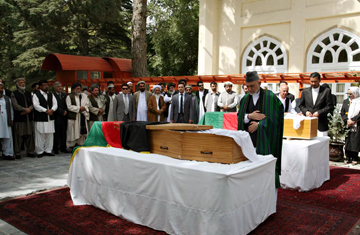
Afghan President Hamid Karzai offers prayers near the coffins of Jan Mohammad Khan and Mohammed Ashim Watanwal, who were killed overnight, at the Presidential Palace in Kabul on July 18, 2011
Gunfire rang out again Sunday night in Kabul, first as single shots and then in stuttering bursts, as two gunmen stormed the villa of President Hamid Karzai's long-standing confidante Jan Mohammad Khan. Armed with AK-47s and grenades, the attackers shot their way into the compound in a leafy quarter of Kabul called Kart-e-Sey, at around 8 p.m. They knocked out Khan's son with the butt of a rifle and killed a guard, according to an officer on the scene with Kabul's criminal-investigations department. Then they shot Khan as he sat on a couch, chatting with a member of parliament who had come to visit.
Khan and the MP Mohammad Hashem Watanwal died instantly, but what followed ran for eight and a half hours as the attackers took hostages and holed up inside the villa. A rapid-reaction force from the Afghan police and intelligence services slowly closed the net, killing one assailant with a direct shot and freeing the last of the hostages shortly before midnight. As dawn broke, and the house burned after the gunmen threw 13 grenades according to one police source, counter-terrorism officers and their foreign advisers ended the siege, blowing apart the wall of the bathroom in which the last surviving attacker was concealed, killing him.
That was the easy part. Khan's death is the second high-profile assassination of an Afghan politician in a week, and will almost certainly add to the shivers of uncertainty rippling across Afghanistan. His peach-colored compound may hardly have been Fort Knox (Khan apparently sent all but one of his guards home each evening) and the Uruzgan strongman may not have been the power that once he was. But taken in conjunction with the assassinations of President Karzai's half-brother on July 12, and the police chief for northern Afghanistan, General Daud Daud, earlier this summer, Khan's killing plays right into the Taliban narrative that no one, no matter how close to Karzai, is safe from their assassination campaign.
Khan was an important figure for Karzai, whose life he is supposed to have saved during a tribal feud some 20 years ago. Then, during the Taliban regime, as Karzai's political ambitions began to flourish, Khan shuttled about trying to persuade the Americans to fund their resistance. In 1999, he was imprisoned by the Islamist government for attending Karzai's father's funeral in Quetta following, appropriately enough, another Taliban hit. These were not debts to be sniffed at. There were rumors in Kabul last week that, after several wilderness years, Khan was to be rewarded with the governorship of Nangarhar in an imminent shake-up.
Yet Khan's heavy-handed approach — he faced multiple allegations of corruption and human-rights abuses and was deeply unpopular — also made him a liability for Karzai. Although he was part of the nexus of strongmen that held southern Afghanistan for the President in the early days of the regime, he became so notorious that in 2006 Dutch forces refused to deploy to Uruzgan unless he was removed from the governorship. The way he battered his way past local opponents meant "there are a lot of people who would like to have him dead," says Martine van Bijlert, of Kabul think tank the Afghanistan Analysts Network and an authority on Uruzgan. "There's a very large chunk that's personal. It can be linked to the Taliban but [they] may not be the only factor."
As it is, the insurgents claimed responsibility for the attack, with their spokesman Zabiullah Mujahid suggesting that Khan's past history had made him a target. "He was cooperating and helping the American forces," Mujahid said, in a possible reference to Khan's reputation for feeding false intelligence to U.S. Special Forces in order to have his rivals taken out. Although there's no conclusive evidence yet that the Taliban had a hand in the killing, it's a no-brainer for the group to claim responsibility. They're "trying to project presence, and [an ability to infiltrate], and penetration and staying power," says Van Bijlert.
And with the U.S. drawdown underway; with under-prepared, under-equipped and under-manned Afghan National Security Forces taking responsibility for more and more of the country until they have complete sovereignty in 2014; and with a looming constitutional crisis and calls from parliamentarians for Karzai to be impeached, there are plenty of reasons for Afghans to worry about what happens next. Even MP Watanwal said just days before his death that neither the government nor NATO was in control of the violence any longer. Yet there's far more to this sense of uncertainty than that issue alone.
"It goes beyond being palace politics, the Karzai regime and what happens with that," says Van Bijlert. "It's about local power relations, about who in the future is going to be controlling economic assets in an area, and who's going to be able to go after whom. There's a lot of positioning going on that is less about what is happening now and more about what is going to happen after transition, and I think there's going to be a lot of violence. Who is going to come out on top? It's often quite localized [and it is these] localized power politics that are sort of matching up with this Taliban tactic of 'Who can we get rid of?'" As Afghans look ahead, they see far too many answers to that question for comfort.
